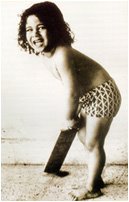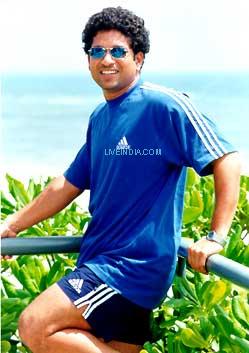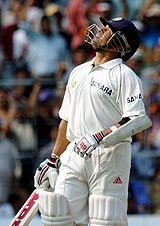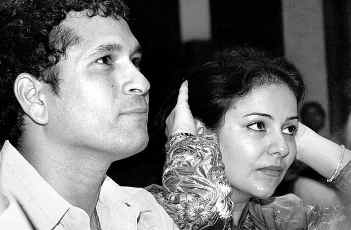 SACHIN RAMESH TENDULKAR
SACHIN RAMESH TENDULKAR
Born in Mumbai (then Bombay) into a middle-class family, Sachin Tendulkar was named after his family's favourite music director Sachin Dev Burman. He went to Sharadashram Vidyamandir School where he started his cricketing career under coach Ramakant Achrekar. While at school, he was involved in a mammoth 664 run partnership in a Harris Shield game with friend and team mate Vinod Kambli. In 1988/1989, he scored 100 not-out in his first first-class match, for Bombay against Gujarat. At 15 years and 232 days he was the youngest to score a century on debut.
Sachin played his first international match against Pakistan in Karachi in 1989, facing the likes of Wasim Akram, Imran Khan, Abdul Qadir, and Waqar Younis. He made just 15 runs, being bowled by Waqar Younis, who also made his debut in that match. It was an inauspicious start, but Tendulkar followed it up with his maiden Test fifty a few days later at Faisalabad. His One-day International (ODI) debut on December 18 was equally disappointing, where he was dismissed without scoring a run, again by Waqar Younis. The series was followed by a non-descript tour of New Zealand in which he fell for 88 in a Test match, John Wright, who would later coach India, pouching the catch that prevented Tendulkar from becoming the youngest centurion in Test cricket. The long anticipated maiden Test century came in England's tour in 1990 but the other scores were not remarkable. Tendulkar truly came into his own in the 1991-1992 tour of Australia that included a brilliant century on the fast and bouncy track at Perth. He has been Man of the Match 11 times in Test matches and Man of the Series twice, both times in the Border-Gavaskar Trophy against Australia.
His first ODI century came on September 9, 1994 against Australia in Sri Lanka at Colombo. It had taken Tendulkar 79 ODIs to score a century.
Sachin Tendulkar is the only player to score a century while making his Ranji Trophy, Duleep Trophy and Irani Trophy debut.
Wisden named Tendulkar one of the Cricketers of the Year in 1997, the first calendar year in which he scored 1,000 Test runs. He repeated the feat in 1999, 2001, and 2002.
Tendulkar also holds the record for scoring 1,000 ODI runs in a calendar year. He has done it six times - 1994, 1996, 1997, 1998, 2000 and 2003. In 1998 he made 1,894 ODI runs, still the record for ODI runs by any batsman in any given calendar year.
While not a regular bowler, Tendulkar has 37 wickets in 132 tests.
Test cricket
Highlights of Tendulkar's Test career include:
- Rated as the second best batsman of all time (next to Don Bradman) by Wisden [1][3]
- Highest number of Test centuries (35), overtaking Sunil Gavaskar's record (34) on 10 December 2005 vs Sri Lanka in Delhi.
- Played in the highest number of Cricket Grounds - he has played Test Cricket on 52 different grounds, ahead of Azharuddin (48), Kapil Dev (47), Inzamam-ul-Haq (46) and Wasim Akram (45).
- He is the fastest to score 10,000 runs in Test cricket history. He holds this record along with Brian Lara. Both of them achieved this feat in 195 innings.
- 4th highest tally of runs in Test cricket (10,323)
- Career Average 55.79 - Has the highest average among those who have scored over 10,000 Test runs
- Second Indian to make over 10,000 runs in Test matches.
- Has 37 Test wickets (14 Dec 2005)
- Second fastest player to reach 9000 runs (Brian Lara made 9000 in 177 innings, Sachin in 179.)
ODI
Highlights of Tendulkar's ODI career include:
- Played more matches than any other cricketer
- Most Man of the Match (50) awards
- Appeared on the most grounds (89 different grounds)
- Most runs (14,146 as of 15th February, 2006)
- Most centuries (39)
- Most centuries vs. Australia, South Africa, New Zealand, Sri Lanka and Zimbabwe.
- First cricketer to cross 10,000-run mark in ODIs
- Only cricketer to cross 14,000-run mark in ODIs
- Only player to have over 100 innings of 50+ runs as of February, 2006
- Over 100 wickets (141 as of 15th February, 2006)
- Highest batting average among batsmen with over 10,000 ODI runs (as of March 17, 2006)
- Highest individual score among Indian batsmen (186* against New Zealand at Hyderabad in 1999)
- Holds the record for scoring 1,000 ODI runs in a calendar year. He has done it six times - 1994, 1996, 1997, 1998, 2000 and 2003.
- In 1998 he made 1,894 ODI runs, still the record for ODI runs by any batsman in any given calendar year.
- In 1998 he hit 9 ODI centuries, the highest by any player in an year.
World Cup
ODI
Highlights of Tendulkar's ODI career include:
- Played more matches than any other cricketer
- Most Man of the Match (50) awards
- Appeared on the most grounds (89 different grounds)
- Most runs (14,146 as of 15th February, 2006)
- Most centuries (39)
- Most centuries vs. Australia, South Africa, New Zealand, Sri Lanka and Zimbabwe.
- First cricketer to cross 10,000-run mark in ODIs
- Only cricketer to cross 14,000-run mark in ODIs
- Only player to have over 100 innings of 50+ runs as of February, 2006
- Over 100 wickets (141 as of 15th February, 2006)
- Highest batting average among batsmen with over 10,000 ODI runs (as of March 17, 2006)
- Highest individual score among Indian batsmen (186* against New Zealand at Hyderabad in 1999)
- Holds the record for scoring 1,000 ODI runs in a calendar year. He has done it six times - 1994, 1996, 1997, 1998, 2000 and 2003.
- In 1998 he made 1,894 ODI runs, still the record for ODI runs by any batsman in any given calendar year.
- In 1998 he hit 9 ODI centuries, the highest by any player in an year.
World Cup
Performance against Pakistan
Tendulkar has often been criticised about his performance against India's arch-rivals, Pakistan. India-Pakistan matches are often the most tense matches and their rivalry is considered to bring out the best in players from both sides.
In the 16 Tests he has played against Pakistan, Tendulkar has scored 918 runs at an average of 39.91 compared to his overall test batting average of 55.39. His top score in a Test match against Pakistan is 194 compared to his overall top score of 248.
In the ODI version of game, Tendulkar does better against Pakistan. In the 61 matches played, Tendulkar has scored 2122 and averages 38.58 compared to his overall ODI Batting average of 44.20.
Criticism and recent performance
The case against Sachin Tendulkar's recent performances was summed up by Wisden Cricketers' Almanack in its 2005 edition: "Apart from a glorious, nothing-to-lose 55 against Australia on a Mumbai terrortrack, watching Tendulkar became a colder experience: after his humbling 2003, he seemed to reject his bewitching fusion of majesty and human frailty in favour of a mechanical, robotic accumulation."
The criticism must be seen against the backdrop of Tendulkar's performance through the years 1994-1999, coinciding with his physical peak, at age 20 through 25. Tendulkar was told to open the batting at Auckland against New Zealand in 1994 . He went on to make 82 runs off 49 balls. This was the beginning of a glorious period, culminating in the Australian tour of 1998-1999, following which Australian spinner Shane Warne ruefully joked that he was having nightmares about his Indian nemesis.
A chronic back problem flared up when Pakistan toured India in 1999, with India losing the historic Test at Chepauk despite a gritty century from Tendulkar himself. Worse was to come as Professor Ramesh Tendulkar, Sachin's father, died in the middle of the 1999 cricket World Cup. Tendulkar, succeeding Mohammad Azharuddin as captain, then led India on a tour of Australia, where the visitors were comprehensively beaten 3-0 by the newly-crowned world champions. Tendulkar resigned, and Sourav Ganguly took over as captain in 2000.
Tendulkar made 673 runs in 11 matches in the 2003 World Cup, helping India reach the finals. While Australia retained the trophy that it had won in 1999, Tendulkar was given the Man of the Series award.
The drawn series as India toured Australia in 2003-2004 saw Tendulkar making his mark in the last Test of the series, with a double century in Sydney. The series was tied 1-1, with Rahul Dravid taking the Man of the Series award.
Tennis elbow then took its toll on Tendulkar, leaving him out of the side for the first two Tests when Australia toured India in 2005. He played a part in the facesaving Indian victory in Mumbai, though Australia had already taken the series 2-1, with the Chennai Test drawn.
Of late, as Wisden noted, Tendulkar has not been his old aggressive self. Expert opinion is divided on whether this is due to his increasing years or the lingering after-effects of injuries over 17 years at the highest level. On 10 December, 2005, at Feroz Shah Kotla, he delighted fans with a record-breaking 35th Test century, against the Sri Lankans. But doubts were raised once again when he averaged a mere 21 over three Test innings when India toured Pakistan in 2006.
On 6 February 2006, Tendulkar scored his 39th ODI hundred, in a match against Pakistan. Tendulkar now has 16 more ODI tons than the man who is second on the list of ODI century-makers, Sourav Ganguly. He followed with a run-a-ball 42 in the second ODI against Pakistan on February 11, 2006, and then a truly masterly 95 in hostile conditions on 13 February, 2006 in Lahore.
On 19 March 2006, after scoring an unconvincing 1 off 21 balls against England in the first innings of the third Test in his home ground, Wankhede, Tendulkar was booed off the ground by a section of the crowd, the first time that he has ever faced such flak. While cheered on when he came for his second innings, Tendulkar was to end the three-Test series without a single half-century to his credit, and news of a shoulder operation raised more questions about his longevity. Geoffrey Boycott was brutal in his assessment: "Sachin Tendulkar is in the worst form of his career...Now that he's going to sit out for a further two months, I don't think he can ever come back to regain what he once had."





